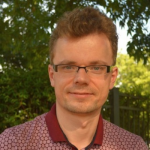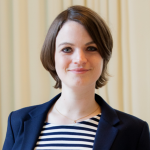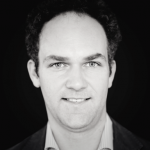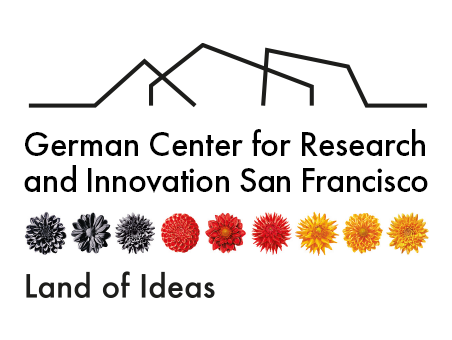Roundtable on Deep Tech and Science-Based Startups

On Friday, July 21st, the German Center for Research and Innovation (DWIH) San Francisco held a private roundtable with Dr. Anna Christmann, Coordinator of German Aerospace Policy at the German Federal Ministry of Economic Affairs and Climate Action (BMWK). The topic, Deep Tech and Science-based Startups, brought together experts in their field to discuss artificial intelligence and the range of new possibilities for AI-based start-ups.
Here were the key takeaways from the event:
Although new startup hubs are emerging in Europe that are trying to attract AI and deep-tech based startups, Silicon Valley still remains the preeminent location for developing and funding AI ventures. Currently, Germany is investing in the future of start-ups and developing start-up competitions currently in Silicon Valley, such as the BASES Annual $100k Start-Up Challenge, which takes place at Stanford each year. With these efforts, Germany aims to become more attractive to AI researchers and improve the country’s start-up ecosystem.
 AI can greatly impact the future of our work and lives, but there must be an effort to educate users about AI and its limitations. One way to inform the users of what AI can and cannot do is to have a product management approach to let users know the appropriate uses of such technologies. For example, tools such as ChatGPT have caused numerous problems for educators due to misuse. Even though ChatGPT’s use in education is currently marred due to plagiarism concerns, AI education must be in the curriculum in the future to properly educate students on the subject.
AI can greatly impact the future of our work and lives, but there must be an effort to educate users about AI and its limitations. One way to inform the users of what AI can and cannot do is to have a product management approach to let users know the appropriate uses of such technologies. For example, tools such as ChatGPT have caused numerous problems for educators due to misuse. Even though ChatGPT’s use in education is currently marred due to plagiarism concerns, AI education must be in the curriculum in the future to properly educate students on the subject.
 One of the biggest changes to AI has been the emergence of new foundational models, resulting in an explosive growth of AI and AI applications. At its core, tools like ChatGPT are large language models, which makes them adept at tasks that can generate new content. These large language models have the capacity transform the medical field, with the potential to translate annotations from different types of doctors as annotation styles and language vary across medical professionals. The uses of AI in medicine are not limited to annotation translation, as there are many emerging AI tools for cancer detection. The limits are endless for how AI can change the medical field; however, currently, there is the issue of AI hallucination, in which AI generates false information. This is clearly an important issue to tackle within generative AI before it can step into more facets of the healthcare system.
One of the biggest changes to AI has been the emergence of new foundational models, resulting in an explosive growth of AI and AI applications. At its core, tools like ChatGPT are large language models, which makes them adept at tasks that can generate new content. These large language models have the capacity transform the medical field, with the potential to translate annotations from different types of doctors as annotation styles and language vary across medical professionals. The uses of AI in medicine are not limited to annotation translation, as there are many emerging AI tools for cancer detection. The limits are endless for how AI can change the medical field; however, currently, there is the issue of AI hallucination, in which AI generates false information. This is clearly an important issue to tackle within generative AI before it can step into more facets of the healthcare system.
In conclusion, Germany is taking steps to become a hotspot for AI start-ups and researchers in AI. Of course, the need to educate users on AI will grow, as AI will impact our lives in many ways, from our education to medicine and beyond. Still, it should be noted that issues within AI still need to be addressed before they can be more integrated into our daily lives.
Participants

Anna Christmann is the Aerospace Coordinator of German Federal Government and the Commissioner for Startups and the Digital Economy at the Federal Ministry of Economic Affairs and Climate Action. Dr. Christmann has been a member of the German Bundestag since 2017 and is part of the parliamentary group Alliance 90/ The Greens. She received her PhD from the University of Bern in 2011 and then worked at the Center for Democracy at the University of Zurich. From 2013, she worked at the Ministry of Science in Stuttgart as the minister's office manager and as a policy advisor in science policy.Anna Christmann

Zahar Barth-Manzoori is the Director of the German Center for Research and Innovation (DWIH) in San Francisco. After completing her doctorate in Islamic Studies at the Christian-Albrechts-Universität zu Kiel – supported by a scholarship from the German Academic Scholarship Foundation – she began working at the DAAD in Bonn in 2011 as head of the Events and Visitor Programs Department. In 2015, she took over the position as Head of Section Joint Scholarship Programs Middle East, North Africa, returning to her professional roots. From May 2020 until her departure for San Francisco, she played a leading role in setting up DWIH San Francisco as head of the DWIH management office at DAAD. As an experienced science manager and passionate networker, she is particularly looking forward to initiating international university collaborations, fostering knowledge transfer between research, business and society, and supporting research-based innovation in San Francisco.Zahar Barth-Manzoori

Hanni Geist is a professional in higher education, fostering exchange between the US and Germany. Originally from Berlin, Hanni now lives in the San Francisco Bay Area and represents the German Academic Exchange Service (DAAD) in the San Francisco office. Since 2013, Hanni supports students and researchers to study, intern, and research in Germany. Hanni is responsible for all activities in the Western region of the US. To increase Germany alumni engagement, Hanni created the podcast Coffee Connections to highlight the diverse experiences in and with Germany. Hanni has presented at NAFSA, the Forum on Education, and Diversity Abroad conference on study, intern, and research opportunities in Germany under the lens of DEI. As a professional in the field of International Education, Hanni focuses on topics related to mental health.Hanni Geist

Ingmar Kanitscheider is a Research Scientist at OpenAI with a background in theoretical physics and computational neuroscience. Originally from Germany and Austria, Ingmar studied physics at the University of Bonn and University of Cambridge. His PhD at the University of Amsterdam focused on String Theory and the black hole information paradox. He then became a postdoctoral researcher in computational neuroscience, where he studied how the brain processes information and how our brain cells help us navigate through complex environments. His fascination with machine learning led him to join OpenAI, where he now studies the science of training large language models. Most recently, he worked on the optimization of GPT-4, the flagship model underpinning ChatGPT.Ingmar Kanitscheider

Hedi Razavi is an entrepreneur, business leader, advisor, and technologist with a passion for building impactful ventures. She is currently the managing partner at German Entrepreneurship and leads the Artificial Intelligence (AI) Competence Center with a mission to enable the adoption, expansion, and internationalization of AI technologies and products developed in Germany. Previously, Hedi was the director of products at C3 AI, the leading provider of enterprise AI solutions, and managed various AI enterprise products. Prior to that, she co-founded and led a Silicon Valley AI+IoT company, Keewi Inc., from idea to exit and focused on transforming electrical outlets to powerful sensors that render the built space more environmentally efficient. Hedi lived in Germany before her entrepreneurial endeavor while leading a global team at St. Jude Medical from the world-renowned Heart Center in Leipzig, Germany. She worked on developing AI-enabled products for heart failure patients resulting in 25 patents and numerous peer-reviewed journal publications. Hedi completed her M.S. and PhD in Bioengineering at Stanford as a National Science Foundation Fellow and a Siebel Scholar. She received her BS in Bioengineering from the University of California at Berkeley as the recipient of the departmental citation award, the highest honor bestowed upon a student in recognition of distinguished work.Hedi Razavi

Julia Schaletzky joined UC Berkeley's Center for Emerging and Neglected Diseases in fall 2017 and is currently the center’s Executive Director. Originally from Germany, Julia trained as a Biochemist at Bayreuth University and completed her studies in the laboratory of Prof. Francis Barr at the Max-Planck-Institute of Biochemistry in Martinsried, Germany. She then went abroad to obtain her PhD in the laboratory of Prof. Tom Rapoport at Harvard Medical School/HHMI. While the main focus was on translocation of proteins across the endoplasmic reticulum membrane, she also volunteered as a mentor for the HHMI EXROP program, training and mentoring students from underrepresented communities over the summer. After completing her PhD, Julia joined Cytokinetics, a biotechnology company in South San Francisco. During her 11 years at Cytokinetics, Julia and her team focused on discovering and developing novel, first-in-class medicines against heart failure and neurodegenerative disorders such as ALS, which are currently in Phase III clinical trials. In addition, she took on several pro-bono projects stemming from academic collaborations, working after hours on successful screens against Trypanosomiasis (sleeping sickness), Malaria and Toxoplasmosis. Julia is passionate about treating neglected and emerging diseases, establishing effective collaboration between academia and industry and about translating basic science into new companies and ultimately cures. In her free time, Julia enjoys learning new skills, socializing with family and friends, and practicing the Arts.Julia Schaletzky

Bjoern M. Eskofier heads the Machine Learning and Data Analytics (MaD) Lab at the Friedrich-Alexander-University Erlangen-Nuernberg (FAU). He is also the founding head of FAU’s Department Artificial Intelligence in Biomedical Engineering (AIBE), spokesperson of the German Ministry of Economic Affairs and Climate Action GAIA-X usecase project “TEAM-X” and co- spokesperson of the German Research Foundation collaborative research center “EmpkinS” (SFB 1483). Dr. Eskofier studied Electrical Engineering at the FAU and graduated in 2006. He then studied under the supervision of Prof. Dr. Benno Nigg at the University of Calgary (Canada). He authored more than 300 peer reviewed articles, submitted 7 patent applications, started three spinoff startup companies, and is in a supporting role for further startups. He won several medical-technical research awards, including the “Curious Minds” award in “Life Sciences” by Manager Magazin and Merck. In 2016, he was a visiting professor at Harvard Medical School (February-March), and in 2018, he was a visiting professor at MIT Media Lab (March-August).Bjoern Eskofier

Brenda Lamboy started the Program Officer position with DWIH San Francisco in December 2022 and has previously worked with the DAAD New York office as the Social Media and Marketing Assistant. She is originally from the Los Angeles area and received both her bachelor’s and master’s degree at California State University Long Beach. Brenda is currently working on her PhD at the University of Cincinnati on the topic of Jewish Hip-Hop in Germany.Brenda Lamboy

Annika Pierson, through various roles in the German and the US healthcare industries, has extensive experience building strong global networks by bringing together investors, entrepreneurs, and senior industry executives. As US CEO of German Entrepreneurship, Annika Pierson manages and further builds out landing pads for international startups throughout the US. In her role as Global Head of Quality & Operations at German Accelerator, she works on setting up the infrastructure to deliver best-in-class support to startups that are entering and scaling in markets around the world. Prior to joining German Entrepreneurship and founding Advise Connect Inspire, LLC in Cambridge, MA, she headed the innovation and entrepreneurship programs of Charité Foundation in Berlin. Annika Pierson is an outspoken advocate for innovation-friendly policies and frequent speaker on how to foster entrepreneurship on a global level. Supporting women entrepreneurs through mentorship and providing them with visibility is an especially important activity that Annika Pierson endeavors to advance. Annika Pierson has played a pivotal role in launching SPARK-BIH and has continued to support the organization through mentorship for program participants, especially around their international expansion strategy.Annika Pierson

Jochen Zimmermann is head of the division “Start-ups and Digital Innovation Hubs” at the Ministry of Economic Affairs and Climate Action. The division’s task is to support the start-up ecosystem in Germany, in particular by the implementation of the “Start-up Strategie” that was passed by the German Federal Government in 2022. After his career as a lawyer, Jochen joined the Ministry in 2013. Since then he served in several branches such as the Departments for Industry as well as the Department for Digitalization and Innovation. From 2019 to 2021 Jochen was deputy head of the Minister’s Office.Jochen Zimmermann

Marc Lendermann heads of the section for economic and commercial affairs at the German consulate general San Francisco. Prior to his current role, Marc has worked at the Federal Chancellery in Berlin, at the German permanent representation to the EU and the Federal Ministry for economic affairs. A lawyer by training, Marc has studied law in Germany and France and holds a Ph.D. from the University of Bonn and the University Paris 1 – Panthéon-Sorbonne.Marc Lendermann

Mirko Wutzler is Vice President for the Representative of German Business (RGB) and, in his role, is responsible for the Innovation Solution Services for the Western US. Mirko has been with RGB in San Francisco since February 2009 and has since successfully consulted various German SMEs in entering the U.S. market and led projects helping German SMEs to engage with Silicon Valley and create economic opportunities. Before joining RGB, he studied economics in Tübingen, San Francisco and Lyon.Mirko Wutzler
